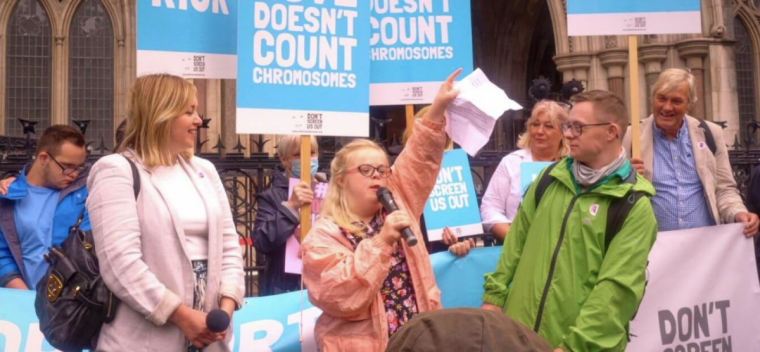High Court rejects discrimination legal challenge by Down's syndrome campaigner

The High Court has today rejected a legal challenge brought against the government by a woman with Down's syndrome.
The landmark case was brought by campaigner Heidi Crowter, who has Down's syndrome, and Máire Lea-Wilson, the mother of a two-year-old with the condition.
They are challenging the government over a disability clause in current abortion laws that means babies with Down's syndrome and other disabilities can be legally aborted up to birth instead of the usual 24 week limit.
They now plan to take their case to the Court of Appeal.
Crowter, from Coventry, said she was not giving up despite the verdict.
"I am really upset not to win but the fight is not over," she said.
"The judges might not think it discriminates against me, the government might not think it discriminates against me but I am telling you that I do feel discriminated against, and the verdict doesn't change how I and thousands in the Down's syndrome community feel.
"We face discrimination every day in schools, in the work place and in society. And now thanks to this verdict the judges have upheld discrimination in the womb too. This is a very sad day but I will keep fighting."
Ms Lea-Wilson, 33, an accountant from Brentford, West London, said she was "incredibly sad and disappointed that the court has chosen not to recognise the value and worth of people with Down syndrome".
She said she would continue to fight for the clause to be removed.
"People with Down syndrome face discrimination in all aspects of life, with the Covid pandemic really shining a light on the dangerous and deadly consequences this can have. This ruling condones discrimination, by cementing the belief in society that their lives are not as valuable as the lives of people without disabilities," she said.
"I am surprised and disappointed to see that the ruling gave very little consideration to the feelings of people with Down syndrome and how section 1(1)(d) of the Abortion Act has a very real and painful impact on their self worth and mental health.
"The judgment also gives very little consideration to the fact that many women, like myself, are pressured to abort much wanted pregnancies at such a late stage in the context of fear and misinformation which is given to them."
Paul Conrathe, solicitor at Sinclairslaw, said it was "a disappointing judgment that is out of step with modern attitudes to disability".
"The judgment fails to recognise the damaging impact UK abortion legislation has upon the mental health and wellbeing of people with Down's syndrome," he said.
"By allowing babies with Down's Syndrome to be aborted up to birth, unlike neurotypical babies, the law sends a powerful message that the lives of people with Down's Syndrome are of lesser value."
Lynn Murray, spokesperson for Don't Screen Us Out, a group campaigning against disability-selective abortion, said the current law "promotes inequality and perpetuates negative stereotypes".
"The provision in the Abortion Act harks back to a time when we thought it was better for people with disabilities not to be part of our society," she said.
"We're a far more progressive society now, we realise that diversity is healthy, and all of our laws should reflect that."











